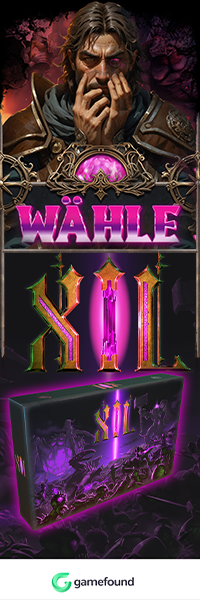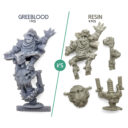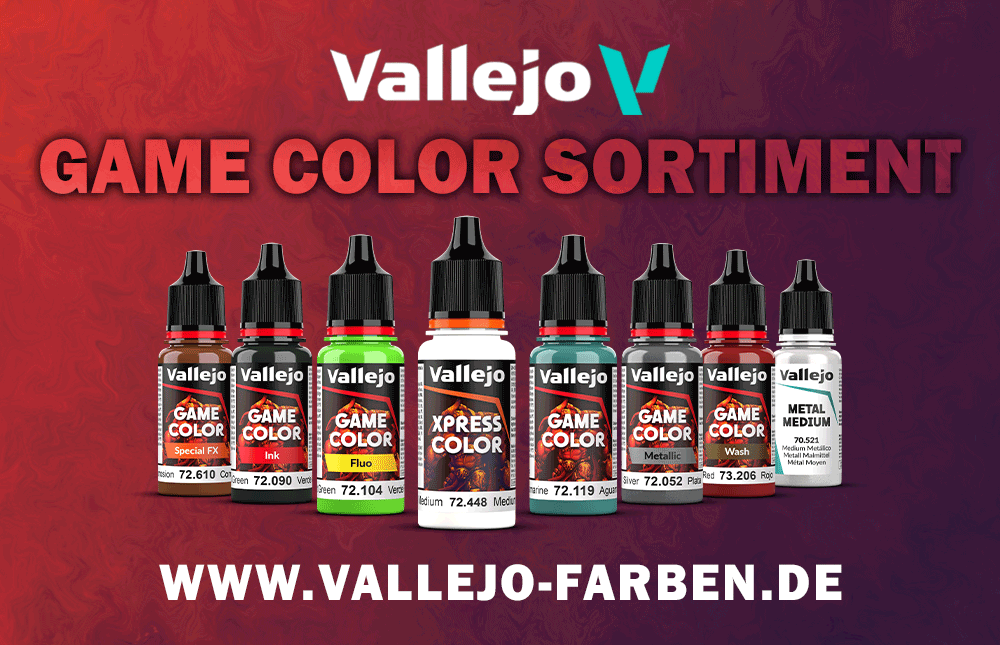Greebo Games: Greeblood
Greebo Games stellen ein neues Herstellungsverfahren für ihre Miniaturen vor.
Greeblood: your usual miniatures, but prettier and hassle-free.
Consider this: in our labs we already produce metal and resin, so why produce this new Greeblood resin? The answer is that we want to give to each and every one of you the best possible product , removing all the hassles that could annoy veteran and novice modelists alike.
Are there any new drawbacks? No, we have managed to remove all the main defects usually found in the materials so far used in this industry without adding new ones. We know this may sound far-fetched, but we’re not known for boasting needlessly, so believe us when we say that we can state this with a lot of confidence. We may have not removed ALL the issues, of course, but as you will understand by reading the following, any “issues” remaining can be easily dealt with by applying some modelist’s common sense, such as ‘don’t throw your miniatures against the wall’.
- (Almost) No assembly needed: all miniatures arrive (except for some pieces, like those requiring a more detailed paintjob) assembled in a single piece. This infinitely improves the piece’s final appearance.
- Extreme detail: we feel that there is no question, and nobody will ever be able to challenge us on this, the level of detail achieved with this resin is the best and we are not afraid to say it. End of story.
- Eco-Friendly: in 2020 we think that avoiding pollution in all its forms is an added value. This does not mean that the material is less durable or strong; it’s simply a more eco-friendly material, and its production is pollution-free. However small our contribution, we are part of the solution and not part of the problem.
- Bubbles or mould lines? No thanks. Another fundamental feature of Greeblood is that you will never find bubbles or mould lines. Ever. Out there even the best casters cannot eliminate them totally, let’s be honest – but you will not find them on Greeblood pieces, since our process makes it mechanically impossible for mould lines or bubbles to appear. What does this mean?
It means that you will never have to clean a miniature, and that no detail will ever be lost again!
Ready to paint: do you want to paint your miniatures straight away when they are delivered to your doorstep whilst maniacally holding your paintbrush? Be our guest! No primer (but you can use if you like a different undercoat, no problem!), no time-consuming dirty cleaning and certainly no spraying anywhere! No spraying anywhere – and therefore one can save time, money and help the environment all at the same time.
What about excess tabs? Whether it’s resin or metal there are always bits going in the bin. Not anymore. End of tabs, end of throwing bits away who knows where. Less waste of time and raw material, so everyone wins
That considered, Greeblood is like any other material, one that, however, needs less work in order to start enjoying it: we only see advantages, what about you?
Avoid boiling everything! Why boil a miniature that does not require cleaning or fiddling?
Let us save time and avoid these extra steps. Greeblood is paint-friendly and designed to be user friendly as well, therefore it does not require a primer, it’s for those who want to directly apply colour, have finished their primer or have found their local shop has mysteriously vanished overnight.
One can dip Greeblood miniatures in water (although we do not understand why one would do that); however, since it is made with eco-friendly materials (unlike standard resin or metal), it should not be left in water over time, since it could suffer damage. It should not be boiled and does not need to be boiled, since, as mentioned above, it comes to your door without any of those issues that can be solved by boiling it.
Can these models be stripped? Of course! Usually, as is the case with all resin pieces, stripping is quite difficult, so it is the same with Greeblood; however, solvents can damage Greeblood minis as much as they can damage plastic or resin. We suggest using liquid detergents, like mild universal degreasers like those that can be commonly found as standard household cleaning items”, which can efficiently remove paint, again, as long as the piece is not submerged for extended periods and is not in contact with solvents.
Regarding conversions, feel free to try (they are of course your models after all); the more experienced modelists will have no issues, but we would recommend extra care to the less experienced ones, since Greeblood is a hard material that is, however, easy to file and shape with modelling blades.
Last but not least: we have already sent out over 600 models, every miniature went to a different tester, and we have got only positive feedback! Only 3 times we got someone that have has boiled the model, of course with a bad ending.
To recap:
- You can expose it to liquids, if it is for a limited amount of time and not a solvent-based liquid.
- You can strip it with non-solvent detergents/degreasers, again, as long as it is not in water for too long.
- You can use files and modelling blades with no issues.
- You can use water on them, however try to avoid temperature of 70 degrees Celsius and above.
Den ersten Eindrücken nach handelt es sich um 3D-gedruckte Modelle, angeblich aus einem umweltfreundlichen Resin (ob damit lediglich wasserlösliches Resin gemeint ist, das keineswegs „eco-friendly“ ist, oder pflanzenbasiertes Resin, ist nicht klar.
Quelle: Greebo Games auf Facebook








Was der Hoff wohl dazu sagen wird… Ich freu mich schon auf die Herz-und-Nieren-Prüfungen. Prodos hatten ja auch sowas. Nur kann ich mich nicht erinnern, solche Superlative bei denen gelesen zu haben.
Prodos Unicast ist letztlich aber ein reguläres Gießverfahren mit extrem verschachtelten und spannenden Gussformen, die einen einteiligen Guss selbst bei sehr komplexen Modellen ermöglichen.
Die He-Man-Modelle sind beispieslweise solche Minis.
Ich kann mich an die ersten Unicast-Aliens erinnern und da hat man schon die Schichten des Drucks noch sehen können. Haben die das irgendwann geändert?
Ich hatte vor 3 Jahren mal den Epic Hector aus dem Prodos-Brettspiel „LOAD“ aufm Drehteller: https://youtu.be/Bu7tkyJN-xY
Ich fand das Ergebnis absolut beeindruckend, sieh selbst.
Haben sie den heiligen Gral entdeckt?
Vielleicht eine Art Druckverfahren – viel anders sehen meine Minis aus dem 3D-Drucker auch nicht aus. Ist ja auch egal – schön, dass sie einen neuen Qualitätsstandard definieren. Ich kannte die bislang nicht, und schaue mir das Sortiment jetzt mal an. DAS haben sie also schonmal geschafft. 😉
Für mich sehen diese neuen Minis auch ziemlich eindeutig nach 3D-Drucken aus.
Und – warum auch nicht?
Mittlerweile sind sehr gute 3D Drucker zu erschwinglichen Preisen zu haben. Da kann es sich eine kleine Firma auch leisten, bspw. 10 Anycubic Mono X oder 10 Elegoo Staurn parallel zu betreiben. Die haben ein großes Druckvolumen und da kann man innerhalb von ein paar Stunden auch schon 100 plus x normal große Minis eienr Sorte drucken.
Und so umgeht man es auch, die STL-Files verkaufen zu müssen, wo man pro Mini nur einmal abkassieren kann.
Ich hab grad gestern meine letzte Greebo-Bestellung mit u.a. einer Greeblood-Mini bekommen. Die sieht mir recht eindeutig nach 3D-gedruckt aus.
Hab zu Weihnachten deren Renek-Modell (Zoat-Alternative für Blood Bowl) als Greeblood bekommen und war von der Qualität extrem begeistert. Selten so eine fantastische Multipart-Figur mit so einer Passgenauigkeit der Teile gesehen. Von der Gratisfigur „Santa Bomball“ (auch Greeblood) war ich allerdings weniger angetan. Die war gut, aber nicht überwältigend.
Insgesamt gefäkkt mir Greebo-Games aber ausgezeichnet. Ich liebe deren Krogall-Figuren. Sind allerdings aus Metall und da muss man schon ordentlich ackern, damit die Teile auch zusammenpassen und selbst dann hab ich noch deutlich sichtbare Lücken (im Gegensatz zu dem oben erwähnten Greeblood-Renek).
Wenn es 3D Druck ist dann haben sie andere Probleme. Wenn auch keine Moldlines, dann in irgendeiner Art gelagerte Spuren von Supports. Selbst Wasserlösliche Supportslösungen, hinterlassen sichtbare Spuren auf den Oberflächen. Kennt denke ich jeder der bei Shapeways bestimmte Druckoptionen mal in der Hand hatte. Laserbasierte Tankdruckverfahren hinterlassen ebenfalls Spuren, denn die ganzen Minis wollen ja irgendwo verbunden sein um sie zusammenhängned aus dem Tank zu bekommen. Für mich hört sich das schlichtweg nach übertriebener Selbstvermarktung an wenn ich ehrlich bin.
Eindeutig nein Druck. Wenn sich jetzt die 4k Drucker bei der breiten Masse durchsetzen, sind solche drücke durchaus Zuhause möglich. Der Saturn hat zwar auch 4k, aber aufgrund des viel größeren Bauraums eine etwas schlechtere Auflösung als der Mars 2 pro.
Wenn man aber bestimmte Modelle möchte, von denen es keine Files gibt, bleibt einem nur der Weg zum Hersteller, gedruckt oder nicht.
Soetwas in der Art habe ich auch schon vermutet. Bisschen übertrieben, wenn sie 3D-Druck als „Bislang nie gesehene Modelle“ verkaufen. 🙂
… but prettier and hassel free.
Ist das ein Seitenhieb auf Kev White’s Firma?